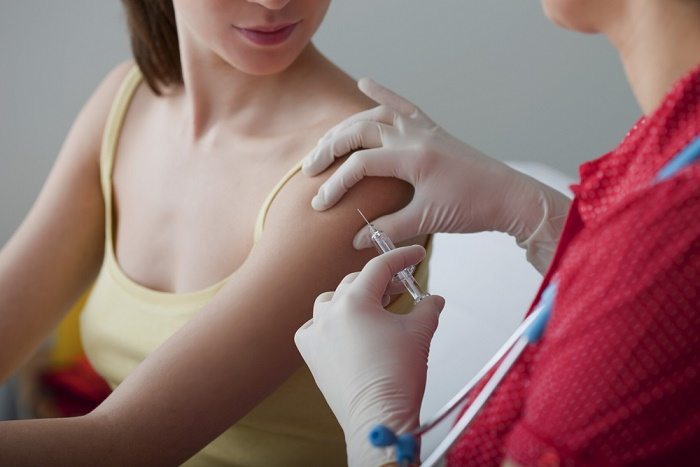Study: Girls With HPV Vaccine Take Fewer Sexual Risks
Since HPV vaccines were introduced almost a decade ago, there has been a fear that vaccinating young girls against sexually transmitted infections will give them license to have sex and increase promiscuity. A new study suggests that the opposite may in fact be true—girls who have been vaccinated are less likely to engage in risky sexual behavior than those who have not.

Since HPV vaccines were introduced almost a decade ago, there has been a fear that vaccinating young girls against a sexually transmitted infection (STI) would lead to increased promiscuity.
There is a large and growing body of evidence that this fear is unfounded, and now a study out of the United Kingdom suggests that the opposite may in fact be true—girls who have been vaccinated are less likely to engage in risky sexual behavior than those who have not.
The UK since 2008 has offered HPV vaccines to all girls ages 12-to-13 as well as a catch-up program that provides vaccines to any woman born after 1990. For this study, researchers reviewed medical records of 363 young women who attended clinics in Northwest England and compared markers of sexual behavior—such as pregnancy tests or sexually transmitted disease (STD) diagnoses—among those who had been vaccinated to those of their unvaccinated peers.
Sixty-three percent of those studied had received one of the three recommended doses of the vaccine.
Researchers found five variables showing significant differences between women who had been vaccinated and those who had not, but all five showed that the vaccinated had lower levels of sexual risk. Those who were not vaccinated were more likely to have had three or more sex partners in the past six months, had anal sex during their last sexual encounter, have gone to the clinic with symptoms of an STD, and have tested positive for chlamydia at their last clinic visit.
In contrast, women who had been vaccinated were more likely to use condoms.
The authors and other public health experts have given a number of possible explanations for these behavioral differences. In the UK, where the government offers vaccinations to everyone, vaccination rates are high. Failure to vaccinate, therefore, may be a marker of other high risk sexual behavior, according to the authors.
On the flip side, the report’s authors explain that “vaccination was taken up by those demonstrating other types of prevention or less risky behaviors.” This does not surprise those in the public health field.
Dr. Jessica Kahn, a professor of pediatrics at Cincinnati Children’s Hospital Medical Center, told Reuters: “Preventive health behaviors tend to cluster, so it makes sense that girls who practice safer behaviors are more likely to be vaccinated.”
Of course, the correlation could go the other way as well. “One explanation for the findings is that girls who are vaccinated receive education about sexual health and prevention which decreases riskier behaviors,” Kahn said.
Either way, the study should be seen as good news to those who are worried that providing vaccines to girls and young women will somehow lead to riskier sexual behavior. And these results echo those of many other studies, including a December study that reviewed the records of 260,000 young women in Ontario and found no evidence that receiving the vaccine led to increased risk of either an unintended pregnancy or an STD.
“These results suggest that concerns over increased promiscuity following HPV vaccination are unwarranted and should not deter from vaccinating at a young age,” the authors of that study concluded.
HPV is a very common STI. The Centers for Disease Control and Prevention estimates that 79 million people in the United States are infected with HPV and 14 million new infections occur annually. Though most people will suffer no long-term health consequences and may never know they have HPV, others may develop cervical cancer or cancers of the head, neck, throat, penis, or anus.
About 12,000 women develop cervical cancer in the United States each year and 4,000 die from it.
The HPV vaccine was approved in by the U.S. Food and Drug Administration in 2006, but uptake has been relatively slow due in part to skepticism about vaccines in general and to the unfounded fear that providing the vaccine will lead to promiscuity.
